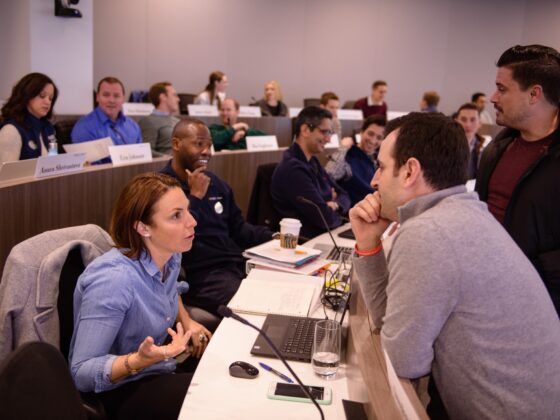As you may have heard, as a pilot for the 2020-21 application cycle, we have introduced a standardized test waiver request process for candidates applying to Darden’s full-time MBA program. In our experience, there are some candidates for whom a standardized test may not be necessary!
Over the past few weeks, the Admissions Team has received a number of questions about this process, and we are thrilled to share this blog post to tackle some of the more common inquiries. We also recommend reviewing our Standardized Test FAQs for even more information about this process.
Let’s talk about standardized tests!
Darden has a broad, holistic admissions process, and we consider a number of factors when assessing a candidate’s potential. Just one of those factors is a standardized test score, and we currently accept the GMAT, GRE, Executive Assessment (EA), MCAT and LSAT.
Within our Admissions Committee, we view waiving the test requirement as a significant step, and, as a result, it’s important that any waiver be supported by substantive evidence.
At Darden, there are no shortcuts, and we want to make sure you are prepared for a rigorous, quantitative MBA program.
It’s worth keeping all of this in mind as you approach our waiver request process, and remember: Receiving a test waiver is in no way indicative of a candidate’s competitiveness in our application process.
Who is most competitive for a test waiver?
This is easily our #1 question. As we note in both our FAQs and the waiver request form, candidates who meet several of the listed criteria will present the strongest case for a waiver. Does this mean two criteria? Three criteria? All of the criteria? It depends! The more criteria you meet, the more likely you are to be granted a waiver, and we can confidently say that meeting only one criterion is insufficient to receive a test waiver.
In our waiver request process, we invite you to make a case for a waiver, but we also recommend thinking objectively about your credentials as you formulate your request. Context matters, and it’s worth remembering that our assessment of your academic and professional profile will be in relation to our typical applicant, not the world at large.
For example, let’s imagine you have decided to request a test waiver, and one of the criteria you are considering is “Strong undergraduate and/or graduate record including performance in analytical coursework or disciplines.”
What makes a “strong” record? When thinking about your academic credentials, it’s worth reviewing our Class of 2021 profile. The average undergraduate GPA for this class is 3.5, so to be “strong,” your undergraduate GPA would likely need to be higher than a 3.5. How much higher? Once again, it depends. Being granted a waiver means meeting more than one of the criteria outlined, and the stronger the case you make (both generally and by criterion), the more likely you are to receive a waiver.
The Big Picture
While we totally understand the benefits of not having to take a test (time, money, etc.), we encourage you to keep the big picture (i.e. our competitive application process) in mind as you consider submitting a test waiver.
What’s going to help you put together the strongest possible application? Some candidates may not need a test score to build their case. Other candidates would benefit from having a test score. Being objective about your candidacy — both your strengths and your weaknesses — will help ensure you put your best foot forward.
With the test waiver process, we encourage you to focus on yourself and what you value as you evaluate your options. Best of luck. We look forward to getting to know you throughout the application process!
Find out more!
Join Executive Director of Admissions Dawna Clarke and Senior Director of Admissions Brett Twitty for a special webinar all about standardized tests and test flexibility!
Application Tips: Standardized Tests and Test Flexibility
View the recording
Check out faculty thought leadership published on Ideas to Action. And stay connected with us via social media: Facebook, Instagram, LinkedIn, Twitter, WeChat





